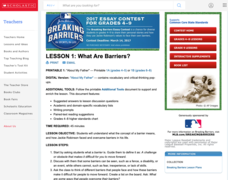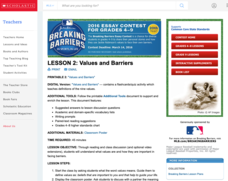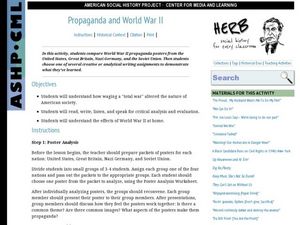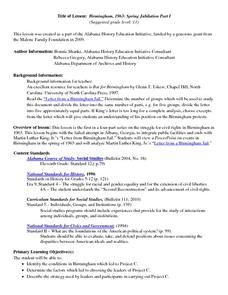City University of New York
African Americans and the Populist Movement
Why did the Populist Party fail to ally itself with African American farmers? To answer this essential question, class members investigate the Populist Era (188-1900) and read an article written by Tom Watson, a Populist leader.
James Madison Memorial Fellowship Foundation
Those "Other Rights:" The Constitution and Slavery
Did the United States Constitution uphold the institution of slavery, or did it help to destroy it? Young historians study Article 4, Section 2, Clause 3 of the Constitution and evaluate the rights of slaveowners as they compared to or...
Curated OER
Woodrow The White House Mouse
Inauguration Day is January 20. Implement an entire week's worth of mini activities to help young historians become knowledgeable of the President's job, the executive branch, and the White House. The worksheets focus on research skills,...
Advocates for Human Rights
Refugees and Asylum Seekers
To gain a deeper understanding of the plight of refugees and asylum seekers, class members read stories written from the point of view of an emigrant, map the individual's journey, and note the human rights affected by each stage of the...
Stanford University
Lesson Plan: Montgomery Bus Boycott
Most of us have heard of Rosa Parks, the Montgomery Bus Boycott, and Martin Luther King, Jr. But what about Claudette Colvin, Virginia Durr, Freedom Summer, or the Birmingham Children's Crusade? A five-instructional activity unit prompts...
PBS
March on Washington: A Time for Change
Young historians conclude their study of the events that lead up to and the planning for the March on Washington. After examining videos and primary source documents, they consider the civil rights objectives that still need to be...
The Alamo
The Alamo
Remember the Alamo! Scholars investigate the Battle of San Jacinto during the Texas Revolution. Using models, maps, quotes, biographies, and the Oath of Allegiance, the Alamo comes to life as the stories of those who fought and died in...
State Bar of Texas
Texas v. Johnson
If you saw a person burning an American flag, how would you feel? Scholars analyze the concept of freedom of expression and speech with the Supreme Court case Texas v. Johnson. A short video clip creates open discussion in pairs on the...
State Bar of Texas
Mendez v. Westminster and Delgado v. Bastrop ISD
You arrive at school only to be told you have no place there. Scholars research the Supreme Court cases Mendez v. Westminster and Delgado v. Bastrop ISD, both dealing with school segregation. Two short video clips as well as small group...
Scholastic
Lesson 1: What Are Barriers?
Scholars discuss the concept of a barrier with a short passage on Jackie Robinson. The writing process begins with a paragraph and several other sentences about Robinson's unique traits that made breaking a barrier possible.
Scholastic
Lesson 2: Values and Barriers
Scholars investigate and discuss the importance of values and how they can be used to break barriers. Small groups work collaboratively to examine the text and draw inferences to answer questions. A writing assignment challenges pupils...
Carolina K-12
Group Project: Freedom Parade
Parades are a great way to celebrate. Get young historians into the festivities by asking them to create an informational float for a Freedom Parade. Picking a topic from the provided list or suggesting one of their own, class members...
Curated OER
Topical Discussions
Engaging in topical discussions can be a great way to teach kids how to build strong arguments and support their opinions with concrete evidence. High schoolers choose a controversial topic, build an argument for or against that topic,...
Curated OER
Social Movements and Constitutional Change: Women's Suffrage
The class analyzes a series of documents intended to show the events that lead to women gaining the right to vote. They play a Tic-Tac-Toe style game, make a time line with sequencing cards, and review the 4 steps of social change....
Curated OER
Propaganda and World War II
What was the true meaning behind WWII propaganda posters? Historians analyze images from the U.S., Great Britain, Nazi Germany, and the Soviet Union, sharing findings in small groups. A poster analysis worksheet and all posters are...
Alabama Department of Archives and History
The Civil War at Home
To conclude a study of the 4 C's (cause, course, consequences, and characters) of the Civil War, young historians examine personal letters that reveal the effects of the war on those at home.
Alabama Department of Archives and History
Birmingham 1963: Spring Jubilation Part 1
As part of a study of the 1963 quest for civil rights in Birmingham, Alabama, class members view a PowerPoint that details the struggle and analyze Martin Luther King, Jr.'s "Letter from a Birmingham Jail."
iCivics
Why Government?
Why do people create governments? Where did we get our ideas about government? This is a fantastic introductory lesson for your American government class that begins by reviewing the philosophies of Thomas Hobbes and John Locke in...
iCivics
Separation of Powers
In a fun and informative simulation, your learners will act in groups as lead chefs, menu writers, and nutrition inspectors in deciding a new school lunch menu. They will then compare and contrast their experience to the interaction...
Curated OER
Identifying, Mapping, and Personifying Countries Involved in WWII
Get artsy with this WWII group activity, starting with a whole-class assignment. Create a map of Europe, Northern Africa, and the Pacific using geometric shapes cut from construction paper and placed on the floor. Consider splitting the...
Curated OER
Jimmy Carter: Civic Action, Lesson 2
Build on high schoolers' awareness of what's wrong with society. Here they examine Jimmy Carter's extensive involvement in volunteer action in the local, national, and global arenas. Define and explore concepts -- philanthropy, citizen,...
Curated OER
Immigration Debates in the Era of "Open Gates"
Young social historians examine immigration debates of the early 20th century through primary sources, such as political cartoons. They analyze the material, discuss their findings, and complete a critical thinking worksheet. All...
Curated OER
Debate: How Should African Americans Achieve Equality?
Each group is assigned a character to play in a mock debate. They read the provided materials, build an argument, and then debate their points of view as their perspective character. The debate focuses on ensuring equality for...
Curated OER
The Poetry of Chinese Immigration
Numerous people from China immigrated to the US during the era of industrialization and expansion. Provide your class with a glimpse into the life of a Chinese immigrant through the poetry they left behind. They then compose a poem of...
Other popular searches
- Substitute Teacher Resources
- Science Teacher Resources
- Teacher Resources Tenses
- Math Teacher Resources
- Esl Teacher Resources
- Computer Teacher Resources
- Teacher Resources Visual Art
- Download Teacher Resources
- French Teacher Resources
- Teacher Resources Rating=3
- Math Teacher Resources K12
- Free Esl Teacher Resources

























